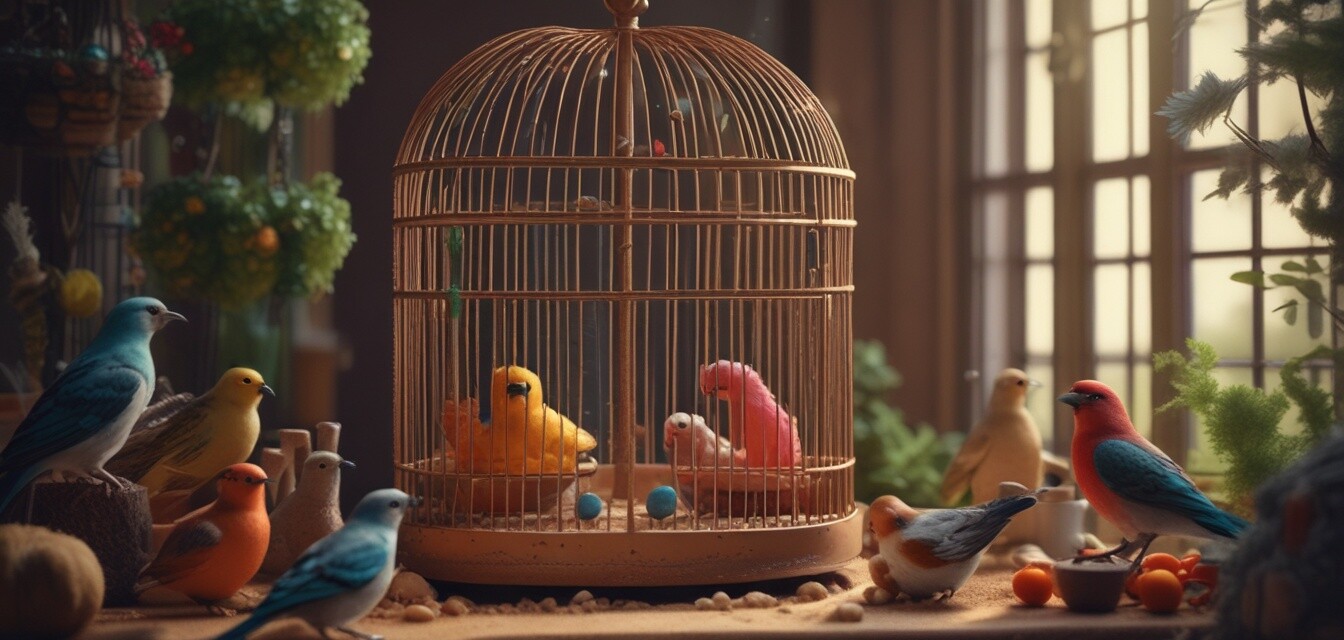
How to Establish a Well-Balanced Bird Routine
Creating a routine for your cage birds is essential for their overall well-being. A well-structured daily schedule can enhance their mental and physical health by ensuring they receive proper care, social interaction, and stimulation. In this article, we'll explore the various components of a balanced bird routine, including feeding, social time, and play activities. Our goal is to help you foster a happy and healthy environment for your feathered friends.
Key Takeaways
- Establish a consistent feeding schedule to regulate nutrition.
- Incorporate daily social interaction for emotional health.
- Provide a variety of toys and activities to stimulate your bird's mind.
- Regular cleaning and maintenance of the bird's living space is crucial.
- Monitor and adjust the routine based on your bird's needs and personality.
The Importance of a Daily Routine
A daily routine brings structure to your bird's life, much like it does for humans. Birds are creatures of habit, and a well-organized schedule can lead to improved mood, reduced stress, and overall happiness. Establishing a routine also helps you manage time better and ensures you address all aspects of your bird's care.
Benefits of a structured routine:
- Promotes mental and physical well-being.
- Helps prevent behavioral issues.
- Ensures birds receive essential nutrients consistently.
- Fosters stronger bonding between you and your bird.
- Enhances the overall quality of life for your pet.
Essential Components of a Well-Balanced Bird Routine
Here are the key elements to consider when establishing your bird's daily routine:
| Routine Component | Description | Recommended Duration |
|---|---|---|
| Feeding | Provide a balanced diet with fresh food and water. | 2-3 times daily |
| Social Interaction | Spend quality time with your bird. | 30 minutes to 1 hour daily |
| Playtime | Engage in fun activities with toys. | 1-2 hours daily |
| Exercise | Encourage flying and climbing. | 30 minutes daily |
| Cleaning | Maintain a hygienic living space. | Once a day, deep clean weekly |
Feeding Your Cage Birds
Nutrition is a vital part of your bird's routine. A balanced diet promotes health, and it is important to establish a consistent feeding schedule. Here are some tips for proper feeding:
- Provide a mix of seeds, pellets, fresh fruits, and vegetables.
- Remove uneaten food promptly to avoid spoilage.
- Keep fresh water available at all times.
- Change food daily to keep it fresh.
Social Time for Birds
Social interaction is important for a bird's emotional well-being. Spending time with your bird helps build trust and strengthens the bond between you. Here are some activities to engage in:
- Talk to your bird regularly.
- Let them percher on your shoulder or hand.
- Practice basic training commands.
- Introduce new experiences gradually.
Engaging Playtime
Playtime is essential for physical and mental stimulation. Providing a variety of toys and activities will keep your birds entertained and help avoid boredom. Consider the following:
- Rotate toys to keep things interesting.
- Incorporate foraging toys for mental challenges.
- Interact with your bird using toys, engaging them actively.
Exercise and Physical Activity
Just like humans, birds need regular exercise to stay healthy. Encouraging movement through flying, climbing, and playing is key. Here are some tips:
- Set up a safe space for your bird to fly indoors.
- Add perches at various heights for climbing opportunities.
- Use a play gym for interactive activities.
Cleaning the Bird's Living Area
A clean living space is essential for a bird's health. Regular cleaning not only keeps your bird safe but also reduces stress and ensures a hygienic environment. Follow these cleaning tips:
- Change bedding material often, ensuring it's non-toxic and absorbent.
- Wash food and water containers regularly.
- Thoroughly clean the cage and all accessories once a week.
Monitoring and Adjusting the Routine
Observing your bird's behavior is essential in ensuring the routine remains effective and enjoyable. Be aware of changes in mood or health, and adjust the routine to fit your bird’s needs:
- Note any unusual behavior, such as lethargy or aggression.
- Monitor weight and eating habits closely.
- Adapt activities to suit their energy levels and preferences.
Tips for Setting Up a Bird Routine
- Consistency is key—try to maintain the same schedule daily.
- Use a calendar or planner to track feeding and activities.
- Be patient and flexible; each bird is an individual.
- Consider utilizing bird health and care products to support your routine. Explore our bird care products here.
Pros
- Improved bird health and happiness.
- Stronger bond between bird and owner.
- Enhanced mental stimulation through varied activities.
- Reduced stress levels for both bird and owner.
Cons
- Requires time and commitment from the owner.
- Possible adjustment period for the bird.
- Potential need for product investments (toys, food, etc.).
Establishing a well-balanced routine for your cage birds can lead to happier, healthier pets. The benefits of a structured schedule extend beyond just feeding; social interaction, play, and exercise are critical for their overall well-being. For more tips on bird care, check out our Cage Bird Health and Care section.
Remember, it’s essential to observe and adjust the routine based on your bird's specific needs. With dedication and love, you can provide a nurturing environment that supports a fulfilling life for your feathered friend.